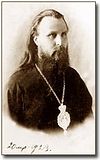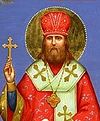

| Previous day | Next day |
| Old Style
April 27
|
Tuesday |
New Style
May 10
|
| 3rd Week after Pascha. Tone 2. | No fast.
|
![]() Apostle of the Seventy and Hieromartyr Symeon the Kinsman of the Lord, bishop of Jerusalem (107).
Apostle of the Seventy and Hieromartyr Symeon the Kinsman of the Lord, bishop of Jerusalem (107).
St. Eulogius the Hospitable, of Constantinople (6th c.). St. Stephen, abbot of the Kiev Caves and bishop of Vladimir in Volhynia (1094). St. Basil (Kishkin), hieroschemamonk of Glinsk and Ploshchansk hermitages (1831).
New Hieromartyrs Paul Svetozarov, archpriest, and John Rozhdestvensky, priest, and with them Martyrs Peter Yazykov, Nicholas Malkov, Auxentius Kalashnikov, Sergius Mefodiev, and Anastasia of Shui and Palekh (Vladimir) (1922). Glorification of New Hieromartyr Hilarion (Troitsky), archbishop of Verey (1999).
St. Pollion the Reader, of Cibalis in Pannonia (306). St. Nicon, abbot, of the monastery of St. Gerasimus (6th c.). St. Floribert, bishop of Luik (Neth.) (746). St. John the Confessor, abbot, of Cathares Monastery at Constantinople (832). Burning of the relics of St. Sava I of Serbia by the Turks (1595).
Thoughts for Each Day of the Year
According to the Daily Church Readings from the Word of God
By St. Theophan the Recluse

Tuesday. [Acts 8:5–17; John 6:27–33]
Then Simon himself believed also: and when he was baptized, he continued with Philip (Acts 8:13). He both believed and was baptized, but nothing came of him. One must think that there was something not quite right in the formation of his faith. Sincere faith is the renunciation of your mind. You must bare your mind and present it to faith as a clean slate, so that faith might inscribe itself on the mind as it is, without any mixing in of alien definitions and tenets. When one’s former beliefs remain in the mind, then a mixture occurs in it after the tenets of faith are written there. The consciousness will be confused between the mind’s sophism and the operations of faith. Simon was therefore a model for all heretics, as all who enter the realm of faith thinking as they did as before. They are confused in the faith and nothing comes of them other than harm: for themselves—when they remain silent, for others—when this confusion is not kept within them alone, but breaks out to others, due to their thirst to be teachers. Hence there always turns out to be a party of people more or less sinning in the faith, with a wretched surety of their correctness, and with a calamitous drive to remake everyone their way.
Articles
 St. Eulogius the Hospitable of ConstantinopleSaint Eulogius the Hospitable lived during the fourth century in the Thebaid. |







